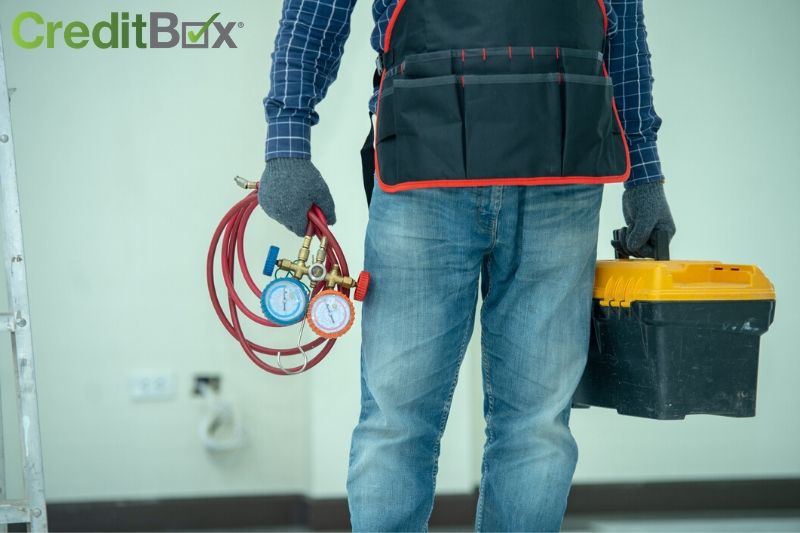
How to Prepare for Freezing Temperatures
Blog icon
Winter is upon us, which means the weather is getting colder fast and freezing temperatures are approaching. Unfortunately, if you aren't prepared, these conditions can cause everything from frozen pipes to problems with your HVAC system. Find out how to properly prepare your home for winter — it'll save you time and money.
Get Your HVAC System Checked
You may not want to pay the fee for an annual inspection, but having a professional come out and check your HVAC system before you fire up the heat for winter can save you big in the long run. It could even save your life. A professional inspector can make sure it's in good working order and won't shut down at the peak of winter. They can also check for carbon monoxide leaks and take care of any minor repairs.
Prevent Frozen Pipes
Freezing temperatures and pipes aren't a great combination, but there are some things you can do to prevent frozen pipes. Otherwise, you may end up with a big flood in your home. Start by keeping your house above 55 degrees Fahrenheit at all times, even when you aren't home. Just be sure you use your central heating system to do so – not a space heater – so that you don't create a fire hazard when you're away. Keep outdoor doors closed and indoor cabinets open to expose your pipes to more heat. You may even want to let your water faucets drip overnight when freezing temperatures reach extreme lows.
Clean Your Gutters
Now that fall is over, your gutters are probably filled with leaves and debris. The longer it stays, the more likely it is to hold water that can damage the outside of your home, whether it freezes or not.
Prepare for Emergencies
Make sure you're prepared for all emergency situations. Put together a winter survival kit with anything you might need if you're snowed in for a few days. Your winter survival kit may include extra blankets, food, and water. Consider purchasing a space heater or two in case your HVAC system does stop working. If you have a fireplace, make sure you have firewood in case you lose power and need a way to heat your home.
Test Your Detectors
If your home isn't already equipped with fire and carbon monoxide detectors, now's the time to change that. If you already have them, test them. More fires happen in winter than during any other time of year, often due to mistakes with fireplaces and space heaters. Also, your home is all closed up, so if there is a carbon monoxide leak, you're at a greater risk for poisoning.
Preparing for winter is necessary, but it isn't always cheap. From putting together a winter survival kit to hiring someone to clean out your gutters, everyone could use some extra cash this time of year. Visit CreditBox today to learn more about installment loans and how you can apply for one today.
Get Your HVAC System Checked
You may not want to pay the fee for an annual inspection, but having a professional come out and check your HVAC system before you fire up the heat for winter can save you big in the long run. It could even save your life. A professional inspector can make sure it's in good working order and won't shut down at the peak of winter. They can also check for carbon monoxide leaks and take care of any minor repairs.
Prevent Frozen Pipes
Freezing temperatures and pipes aren't a great combination, but there are some things you can do to prevent frozen pipes. Otherwise, you may end up with a big flood in your home. Start by keeping your house above 55 degrees Fahrenheit at all times, even when you aren't home. Just be sure you use your central heating system to do so – not a space heater – so that you don't create a fire hazard when you're away. Keep outdoor doors closed and indoor cabinets open to expose your pipes to more heat. You may even want to let your water faucets drip overnight when freezing temperatures reach extreme lows.
Clean Your Gutters
Now that fall is over, your gutters are probably filled with leaves and debris. The longer it stays, the more likely it is to hold water that can damage the outside of your home, whether it freezes or not.
Prepare for Emergencies
Make sure you're prepared for all emergency situations. Put together a winter survival kit with anything you might need if you're snowed in for a few days. Your winter survival kit may include extra blankets, food, and water. Consider purchasing a space heater or two in case your HVAC system does stop working. If you have a fireplace, make sure you have firewood in case you lose power and need a way to heat your home.
Test Your Detectors
If your home isn't already equipped with fire and carbon monoxide detectors, now's the time to change that. If you already have them, test them. More fires happen in winter than during any other time of year, often due to mistakes with fireplaces and space heaters. Also, your home is all closed up, so if there is a carbon monoxide leak, you're at a greater risk for poisoning.
Preparing for winter is necessary, but it isn't always cheap. From putting together a winter survival kit to hiring someone to clean out your gutters, everyone could use some extra cash this time of year. Visit CreditBox today to learn more about installment loans and how you can apply for one today.
